广东中考英语专项--反义疑问句语法讲解及练习(含答案)
初中英语语法之反义疑问句详解及强化练习含答案
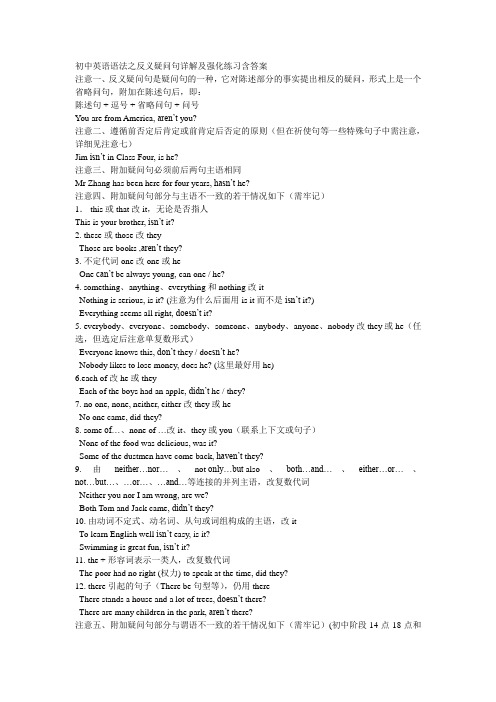
初中英语语法之反义疑问句详解及强化练习含答案注意一、反义疑问句是疑问句的一种,它对陈述部分的事实提出相反的疑问,形式上是一个省略问句,附加在陈述句后,即:陈述句 + 逗号 + 省略问句 + 问号You are from America, aren’t you?注意二、遵循前否定后肯定或前肯定后否定的原则(但在祈使句等一些特殊句子中需注意,详细见注意七)Jim isn’t in Class Four, is he?注意三、附加疑问句必须前后两句主语相同Mr Zhang has been here for four years, hasn’t he?注意四、附加疑问句部分与主语不一致的若干情况如下(需牢记)1. this 或that改it,无论是否指人This is your brother, isn’t it?2. these或those改theyThose are books ,aren’t they?3. 不定代词one改one或heOne can’t be always young, can one / he?4. something、anything、everything和nothing改itNothing is serious, is it? (注意为什么后面用is it而不是isn’t it?)Everything seems all right, doesn’t it?5. everybody、everyone、somebody、someone、anybody、anyone、nobody改they或he(任选,但选定后注意单复数形式)Everyone knows this, don’t they / doe sn’t he?Nobody likes to lose money, does he? (这里最好用he)6.each of改he或theyEach of the boys had an apple, didn’t he / they?7. no one, none, neither, either改they 或heNo one came, did they?8. some of…、none of …改it、they或you(联系上下文或句子)None of the food was delicious, was it?Some of the dustmen have come back, haven’t they?9. 由neither…nor…、not only…but also、both…and…、either…or…、not…but…、…or…、…and…等连接的并列主语,改复数代词Neither you nor I am wrong, are we?Both Tom and Jack came, didn’t they?10. 由动词不定式、动名词、从句或词组构成的主语,改itTo learn English well isn’t easy, is it?Swimming is great fun, isn’t it?11. the + 形容词表示一类人,改复数代词The poor had no right (权力) to speak at the time, did they?12. there 引起的句子(There be句型等),仍用thereThere stands a house and a lot of trees, doesn’t there?There are many children in the park, aren’t there?注意五、附加疑问句部分与谓语不一致的若干情况如下(需牢记)(初中阶段14点18点和19点可以常识性了解)1. have (有)改have或doMary has two brothers, doesn’t she / hasn’t she?2. have (有)必须与陈述部分一致He hasn’t a lot of time, has he?Miss Green doesn’t have any money in her pocket, does she?3. have不做“有”解释,必须用doThey all have a good time, don’t they?4. have to用do或haveWe have to get up early, don’t we / haven’t we?5. have got to用haveWe have got to answer all the questions, haven’t we?6. had better用should或hadWe had better go right now, shouldn’t we / hadn’t we?7. can’t(不可能,表示推测)根据can’t或的动词选择相应的形式He can’t be a doctor, is he?The workers can’t have finished their work, have they?8. may 用may + 主语 + not (英语中不用mayn’t)They may be here next week, may they not?9. must(必须)用needn’tYou must do it today, needn’t you?10. must(应该)用mustn’tI must study hard, mustn’t I?11. mustn’t用must或mayYou mustn’t talk like that, must you?We mustn’t stay here any longer, must we?12. “must be”对现在情况进行推测作一般现在时或现在进行时的附加疑问句进行处理2 反义疑问句He must be happy, isn’t he?He must be working hard at the office, isn’t he?must表示推测时,也有用mustn’t的He must have been working very hard, mustn’t he?You must have told Mr Wang the secret, mustn’t you?13. “must + 完成时”表示对过去情况的推测,作一般过去时附加疑问句处理He must have come yesterday, didn’t he?You must have seen the play last week, didn’t you?14. “must + 完成时”用来推测过去的动作持续到现在按现在完成时的附加疑问句来处理 You must have studied English for years, haven’t you?He must have lived here for at least ten years, hasn’t he?14. 实义动词need和dear用doHe needs help, doesn’t he?I have never dared to ask him, have I?15. 情态动词need和dear用need和dearHe dare not say so, dare he?We need not do it again, need we?16. need n’t用need或mustYou needn’t go yet, need you?He needn’t do that, must he?17. “ would rather + 动词原形”和“would like to + 动词原形”用wouldn’tHe would rather read the text ten times than recite it, wouldn’t he?You’d like to have some bananas, wouldn’t you?18. “ought to + 动词原形”用oughtn’t或shouldn’tThe child ought to be punished, oughtn’t he?We ought to go there, shouldn’t we?19. “used to + 动词原形”用“didn’t + 主语”或“usedn’t + 主语”或“used + 主语 + not”He used to live in London, usedn’t he / didn’t he?He used to play football when he was a child , used he not?注意六、句子中有seldom, hardly, no, not, never, few, little, nothing, nobody, nowhere等是否定句,附加疑问部分必须采用肯定形式Nobody phoned while I was out, did they?He is hardly able to swim, is he?There is little ink in your pen, is there?no one, nobody, none, nothing, neither等作动词的宾语时,附加疑问部分一般采用肯定形式(也偶尔用否定形式)He has nothing to say, does(n’t) he?You got nothing from him, did(n’t) you?注意七、一些特殊句型的附加疑问句1. I am…改aren’t II am your friend, aren’t I?2. I wish to do sth或I wish I …改may II wish to go home, may I?I wish I were you, may I?3. 主从复合句,与主句的主谓语保持一致He says that I did it, doesn’t he?David wouldn’t go there if it rained, would he?4. 并列句,与邻近的分句保持一致Mary is a nice girl, but she had one short-coming, hadn’t she?5. 表示邀请,请求的祈使句,附加疑问部分用will you或won’t you或would you等,一般只要记住will you就可以了,不遵循前否定后肯定或前肯定后否定的原则Come here, will you?Turn off the light, will you?Do sit down, will you?6. 表示告诉别人做某事的祈使句,用will you、can you、would you或can’t you、won’t you Stop talking, can you?Write down the new words, will you / won’t you?7. 否定的祈使句用will you或can youDon’t make a noise, will / can you?8. Let me …用will you 或may ILet me help you, may I?Let me do it, will you?9. Let’s…表示建议包括听话人在内,用shall weLet’s go for a walk, shall we?10. let us …表示允许,不包括听话人在内,用will youLet us do it by ourselves, will you?11. Let接第三人称宾语时用will youLet him come in, will you?12. Let’s not …用OK或all rightLet’s not go to the party, OK / all right?13. 感叹句用一般现在时be的形式(故事中用一般过去时be的形式)What fine weather, isn’t it?How clever the boy is, isn’t he?How hard she works, isn’t she?反意疑问句试题及答案一.完成下列反意疑问句, 一空一词:1.We must go at once, ?2.My uncle used to smoke, ?3.She must be a music lover, ?4.You need to have a good dictionary, ?5.Let us do the jobs ourselves, ?6.There used to be an old stone bridge across the river, ?7.Please turn down the radio, ?8.There were few people there, ?9.If anybody comes here, he will be welcome, ?10.You must have seen her yesterday, ?二、把下列各句改成反意疑问句:11.I think he is right.12.I don’t think you're seriously i ll.13.I don’t suppose they will be back soon.14.Don’t do such a job.15.You needn’t do that when your daughter is here.16.What you need is more practice.17.He says that it is really true.18.He dared to ask the teacher many questions.19.That is an honest girl?20.Tom hasn’t much time to spare.三、将下列句子译成英语(一空一词):21.人无完人, 对吗?, ?22.你每年冬天感冒, 是不是?, ?23.你伯父过去住在宁波, 对不对??24.A:他不想买这辆十速自行车, 对吗?B:对, 他不想买。
中考英语反义疑问句、感叹句讲解及习题
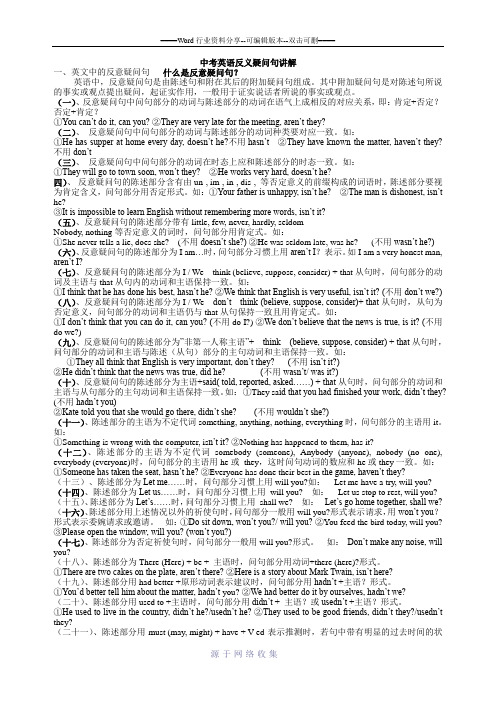
中考英语反义疑问句讲解一、英文中的反意疑问句什么是反意疑问句?英语中,反意疑问句是由陈述句和附在其后的附加疑问句组成。
其中附加疑问句是对陈述句所说的事实或观点提出疑问,起证实作用,一般用于证实说话者所说的事实或观点。
(一)、反意疑问句中问句部分的动词与陈述部分的动词在语气上成相反的对应关系,即:肯定+否定?否定+肯定?①You can’t do it, can you? ②They are very late for the meeting, aren’t they?(二)、反意疑问句中问句部分的动词与陈述部分的动词种类要对应一致。
如:①He has supper at home every day, doesn’t he?不用hasn’t②They have known the matter, haven’t they?不用don’t(三)、反意疑问句中问句部分的动词在时态上应和陈述部分的时态一致。
如:①They will go to town soon, won’t they? ②He works very hard, doesn’t he?四)、反意疑问句的陈述部分含有由un-, im-, in-, dis-, 等否定意义的前缀构成的词语时,陈述部分要视为肯定含义,问句部分用否定形式。
如:①Your father is unhappy, isn’t he? ②The man is dishonest, isn’t he?③It is impossible to learn English without remembering more words, isn’t it?(五)、反意疑问句的陈述部分带有little, few, never, hardly, seldomNobody, nothing等否定意义的词时,问句部分用肯定式。
如:①She never tells a lie, does she? (不用doesn’t she?)②He was seldom late, was he? (不用wasn’t he?) (六)、反意疑问句的陈述部分为I am…时,问句部分习惯上用aren’t I?表示。
中考英语反义疑问句讲解及练习题

中考英语反义疑问句讲解及练习题1.前肯+后否?一、反意疑问句中问句部分的动词在时态上应和陈述部分的时态一致。
如:1. You can do it, can ' you ?2.They are very late for the meeting, aren ' t the?3.He has supper at home every day, doesn' t he? (不能用hasn' t he?)4.They have known the matter, haven' t they?5.They will go to town soon, won' t they?6.He worked very hard, did n' t h?他过去工作很努力,对吧?Yes, he did. No, he didn ' t.是的,他很努力。
不,他工作不努力。
二.前否(定)+后肯(定)?反意疑问旬的陈述部分含有not no , nothing, no one, never, hardly, little, few , seldom 等表否定的词。
变反意疑问句时要用前否(定)+后肯(定)?如:1. He isn ' playing football now, is he ?2.She never tells a lie, does she ?(不用doesn' t she?)3.I have few books, do I ?4.He was seldom late, was he ?(不用wasn' t he?)5.There is little water in the bag, is there ?6.Nothing is in the room, is it ?房间里什么也没有,是吗?7,The boys and girls have never been to Chongqing, have they? 孩子们从未去过重庆,对吧?三.由un-, im-, in-, dis -,等否定意义的前缀构成的词语时,陈述部分要视为肯定含义,问/部分用否定形式。
初中英语反义疑问句讲解-练习及答案
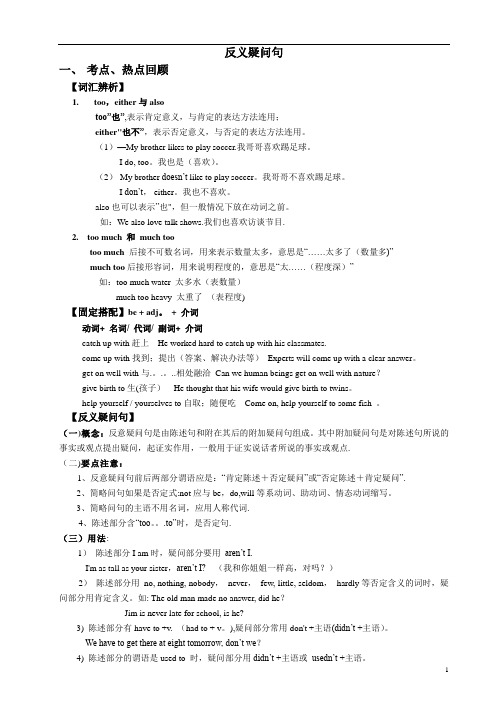
反义疑问句一、考点、热点回顾【词汇辨析】1.too,either与alsotoo”也”,表示肯定意义,与肯定的表达方法连用;either"也不”,表示否定意义,与否定的表达方法连用。
(1)—My brother likes to play soccer.我哥哥喜欢踢足球。
-I do, too。
我也是(喜欢)。
(2)-My brother doesn’t like to play soccer。
我哥哥不喜欢踢足球。
-I don’t, either。
我也不喜欢。
also也可以表示”也",但一般情况下放在动词之前。
如:We also love talk shows.我们也喜欢访谈节目.2. too much 和much tootoo much 后接不可数名词,用来表示数量太多,意思是“……太多了(数量多)”much too后接形容词,用来说明程度的,意思是“太……(程度深)”如:too much water 太多水(表数量)much too heavy 太重了(表程度)【固定搭配】be + adj。
+ 介词动词+ 名词/ 代词/ 副词+ 介词catch up with赶上He worked hard to catch up with his classmates.come up with找到;提出(答案、解决办法等)Experts will come up with a clear answer。
get on well with与.。
.。
..相处融洽Can we human beings get on well with nature?give birth to生(孩子)He thought that his wife would give birth to twins。
help yourself / yourselves to自取;随便吃Come on, help yourself to some fish 。
(完整版)初中英语反义疑问句讲解_练习及答案
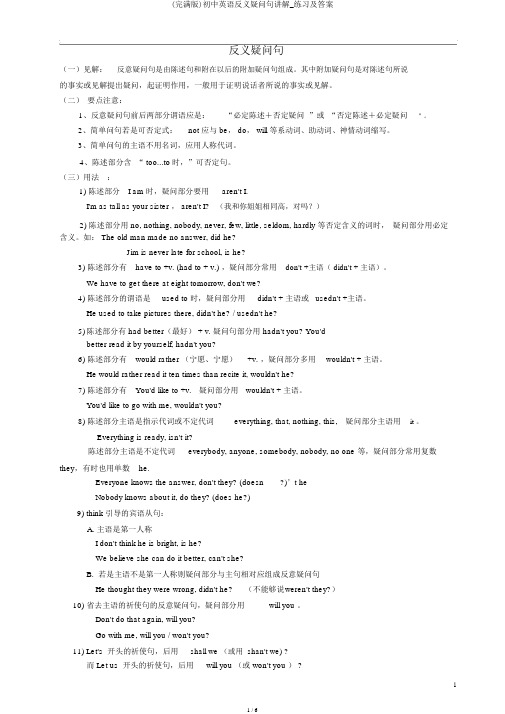
反义疑问句(一)见解:反意疑问句是由陈述句和附在以后的附加疑问句组成。
其中附加疑问句是对陈述句所说的事实或见解提出疑问,起证明作用,一般用于证明说话者所说的事实或见解。
(二)要点注意:1、反意疑问句前后两部分谓语应是:“必定陈述+否定疑问”或“否定陈述+必定疑问”。
2、简单问句若是可否定式:not 应与 be, do, will 等系动词、助动词、神情动词缩写。
3、简单问句的主语不用名词,应用人称代词。
4、陈述部分含“ too...to时,”可否定句。
(三)用法:1) 陈述部分I am 时,疑问部分要用aren't I.I'm as tall as your sister , aren't I?(我和你姐姐相同高,对吗?)2) 陈述部分用 no, nothing, nobody, never, few, little, seldom, hardly 等否定含义的词时,疑问部分用必定含义。
如: The old man made no answer, did he?Jim is never late for school, is he?3) 陈述部分有have to +v. (had to + v.) ,疑问部分常用don't +主语( didn't + 主语)。
We have to get there at eight tomorrow, don't we?4) 陈述部分的谓语是used to 时,疑问部分用didn't + 主语或usedn't +主语。
He used to take pictures there, didn't he? / usedn't he?5)陈述部分有 had better(最好) + v. 疑问句部分用 hadn't you? You'dbetter read it by yourself, hadn't you?6) 陈述部分有would rather (宁愿、宁愿)+v. ,疑问部分多用wouldn't + 主语。
反义疑问句及中考题训练(含标准答案).doc
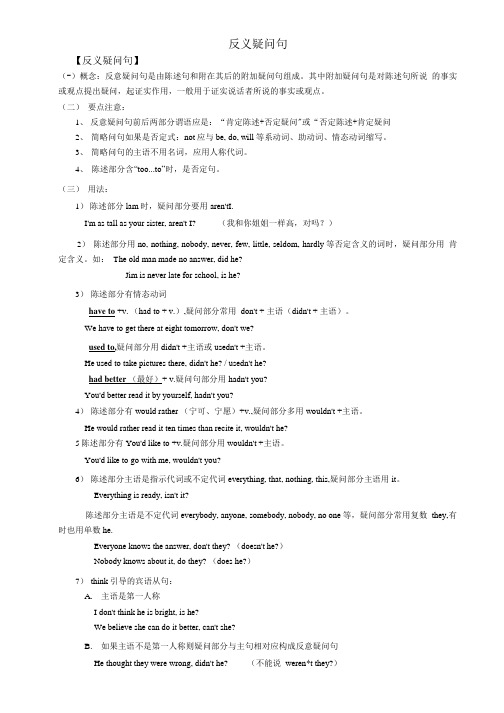
反义疑问句【反义疑问句】(-)概念:反意疑问句是由陈述句和附在其后的附加疑问句组成。
其中附加疑问句是对陈述句所说的事实或观点提出疑问,起证实作用,一般用于证实说话者所说的事实或观点。
(二)要点注意:1、反意疑问句前后两部分谓语应是:“肯定陈述+否定疑问"或“否定陈述+肯定疑问2、简略问句如果是否定式:not应与be, do, will等系动词、助动词、情态动词缩写。
3、简略问句的主语不用名词,应用人称代词。
4、陈述部分含“too...to”时,是否定句。
(三)用法:1)陈述部分lam时,疑问部分要用aren'tI.I'm as tall as your sister, aren't I? (我和你姐姐一样高,对吗?)2)陈述部分用no, nothing, nobody, never, few, little, seldom, hardly等否定含义的词时,疑问部分用肯定含义。
如:The old man made no answer, did he?Jim is never late for school, is he?3)陈述部分有情态动词have to +v. (had to + v.),疑问部分常用don't + 主语(didn't + 主语)。
We have to get there at eight tomorrow, don't we?used to,疑问部分用didn't +主语或usedn't +主语。
He used to take pictures there, didn't he? / usedn't he?had better (最好)+ v.疑问句部分用hadn't you?You'd better read it by yourself, hadn't you?4)陈述部分有would rather (宁可、宁愿)+v.,疑问部分多用wouldn't +主语。
中考英语反义疑问句讲解及习题!
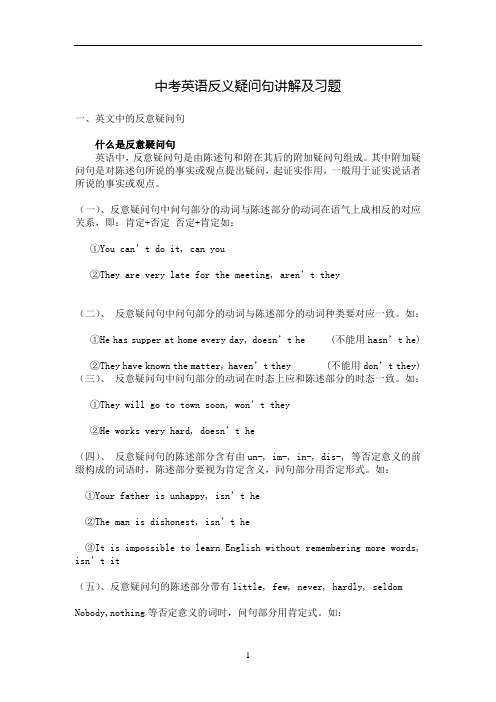
中考英语反义疑问句讲解及习题一、英文中的反意疑问句什么是反意疑问句英语中,反意疑问句是由陈述句和附在其后的附加疑问句组成。
其中附加疑问句是对陈述句所说的事实或观点提出疑问,起证实作用,一般用于证实说话者所说的事实或观点。
(一)、反意疑问句中问句部分的动词与陈述部分的动词在语气上成相反的对应关系,即:肯定+否定否定+肯定如:①You can’t do it, can you②They are very late for the meeting, aren’t th ey(二)、反意疑问句中问句部分的动词与陈述部分的动词种类要对应一致。
如:①He has supper at home every day, doesn’t he (不能用hasn’t he)②They have known the matter, haven’t they (不能用don’t they) (三)、反意疑问句中问句部分的动词在时态上应和陈述部分的时态一致。
如:①They will go to town soon, won’t they②He works very hard, doesn’t he(四)、反意疑问句的陈述部分含有由un-, im-, in-, dis-, 等否定意义的前缀构成的词语时,陈述部分要视为肯定含义,问句部分用否定形式。
如:①Your father is unhappy, isn’t he②The man is dishonest, isn’t he③It is impossible to learn English without remembering more words, isn’t it(五)、反意疑问句的陈述部分带有little, few, never, hardly, seldomNobody,nothing等否定意义的词时,问句部分用肯定式。
如:①She never tells a lie, does she (不用doesn’t she)②He was s eldom late, was he (不用wasn’t he)(六)、反意疑问句的陈述部分为I am……时,问句部分习惯上用aren’t I 表示。
(完整版)广东中考英语专项--反义疑问句语法讲解及练习(含答案)

(完整版)广东中考英语专项--反义疑问句语法讲解及练习(含答案)一、反义疑问句的基本结构与形式反义疑问句(The DisjunctiveQuestion) 即附加疑问句,是英语四大问句之一。
它表示提问人的看法,没有把握,需要对方证实。
句尾升调表示疑问,降调表示反问。
反意疑问句,由一个陈述句加上一个短问句而构成,基本构成形式是:陈述句+动词(肯定或否定)+主语?如:①She often has lunch at school, doesn’t she?②You don’t like sports, do you?反意疑问句通常对应规则:一)、反意疑问句中问句部分的动词与陈述部分的动词在语气上成相反的对应关系,即:)肯定+否定?否定+肯定?如:①You can’t do it, can you?②They are very late for the meeting, aren’t they?二)、反意疑问句中问句部分的动词与陈述部分的动词种类要对应一致。
如:①He has supper at home every day, doesn’t he? (不能用hasn’t he?)②They have known the matter, haven’t they? (不能用don’t they?)三)、反意疑问句中问句部分的动词在时态上应和陈述部分的时态一致。
如:①They will go to town soon, won’t they?(不能用don’t they?或aren’t they?)②He works very hard, doesn’t he?(不能用didn’t he?或won’t he?)基础练习1. You are an actor, ________ _____ ?2. He is a good boy, ________ ______ ?3. It was fine yesterday, _______ ___ ?4. You were studying when I called you last night, __________ _____ ?5. She is going to visit me, _____ ____?6. I am Chinese, ______ ____?7. It often rains here, ________ ___ ?8. He likes soccer, _________ ____ ?9. You have a headache, _______ ___ ?10. I called you yesterday, _______ __?11. You will go to America, ______ ___ ?12. We have ever been to Shanghai, _________ ______ ?13.His mother is a doctor, ______ ____ ?14. The dogs are fighting, _______ _____?15 There is a boy in our classroom, _______ _______ ?17. There were many cars in the street,_________ ________ ?18. There will be robots in our families,________ ______ ?19. Sit down please, _______________ ?20. Please call me, _________________?21. Let’s go home,_________ ?22. Let us go home, ________________ ?23 . Let me see, __________________ ?答案1.aren't you 2.isn't he 3.wasn't it 4.didn't you 5.won't she 6.aren't 7.doesn't it 8.doesn't he9.don't you 10.didn't you 11.won't you 12.haven't we 13.isn't she 14.aren't they 15.isn't there 17.weren't there 18.won't there19.will you 20.will you 21.shall we22.will you 23.will you二、反义疑问句的回答反义疑问句的回答始终遵从事实,事实是肯定用Yes+肯定句,事实是否定用no+否定句,如事实是你喜欢英语:You like English,don't you? Yes,I do.(是的,我喜欢。
反义疑问句讲解和练习(答案)

反义疑问句讲解和练习(答案)反意疑问句英语中的反意疑问句是由陈述句和附在其后的附加疑问句组成。
附加疑问句是对___所说的事实或观点提出疑问,起证实作用,一般用于证实说话者所说的事实或观点。
回答时,如果情况属实,用Yes加上反问句的倒装肯定句;若果情况不属实,则用No加上反问句的倒装否定句。
反意疑问句中问句部分的动词与陈述部分的动词在语气上成相反的对应关系,即:肯定+否定?否定+肯定?当陈述句中含有be动词,助动词,或是情态动词时,反问句部分由这些词加上主语人称代词构成。
例如:You can’t do it。
can you。
你不能做它,是吗?They are very late for the meeting。
___。
他们开会迟到了,是吗?She is a lovely girl。
isn’t she。
她是一个可爱的女孩,是吗?He will go home。
won’t he。
他要回家了,是吗?She doesn’t like to eat popcorn。
does she。
她不喜欢吃爆米花,是吗?The baby won’t sleep early。
will it。
小宝宝睡得不早,是吗?需要注意的是,当陈述句中含有have时,反问句部分不能用hasn’t he或don’t they,而应该用___。
例如:He has supper at home every day。
doesn’t he。
他每天在家吃晚饭,是吗?They have known the matter。
___。
他们已经知道那事情了,是吗?小试牛刀:It’s very hot today。
isn’t it?He can speak Chinese。
can’t he?It’s a good day for swimming。
isn’t it?Tom has been to Singapore。
hasn’t he?She doesn't like climbing hills。
中考英语反义疑问句讲解及练习题
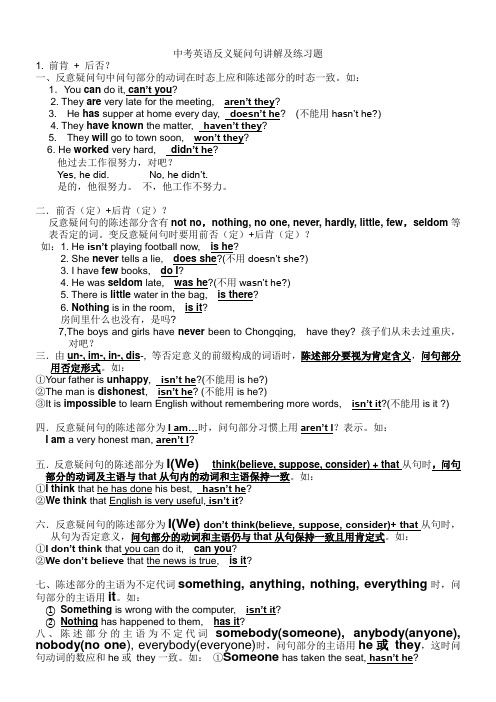
中考英语反义疑问句讲解及练习题1. 前肯+ 后否?一、反意疑问句中问句部分的动词在时态上应和陈述部分的时态一致。
如:1.You can do it, can’t you?2. They are very late for the meeting, aren’t they?3. He has supper at home every day, doesn’t he? (不能用hasn’t he?)4. They have known the matter, haven’t they?5. They will go to town soon, won’t they?6. He worked very hard, did n’t he?他过去工作很努力,对吧?Yes, he did. No, he didn’t.是的,他很努力。
不,他工作不努力。
二.前否(定)+后肯(定)?反意疑问句的陈述部分含有not no,nothing, no one, never, hardly, little, few,seldom等表否定的词。
变反意疑问句时要用前否(定)+后肯(定)?如:1. He isn’t playing football now, is he?2. She never tells a lie, does she?(不用doesn’t she?)3. I have few books, do I?4. He was seldom late, was he?(不用wasn’t he?)5. There is little water in the bag, is there?6. Nothing is in the room, is it?房间里什么也没有,是吗?7,The boys and girls have never been to Chongqing, have they? 孩子们从未去过重庆,对吧?三.由un-, im-, in-, dis-, 等否定意义的前缀构成的词语时,陈述部分要视为肯定含义,问句部分用否定形式。
中考反义疑问句详解及练习和答案-(1)
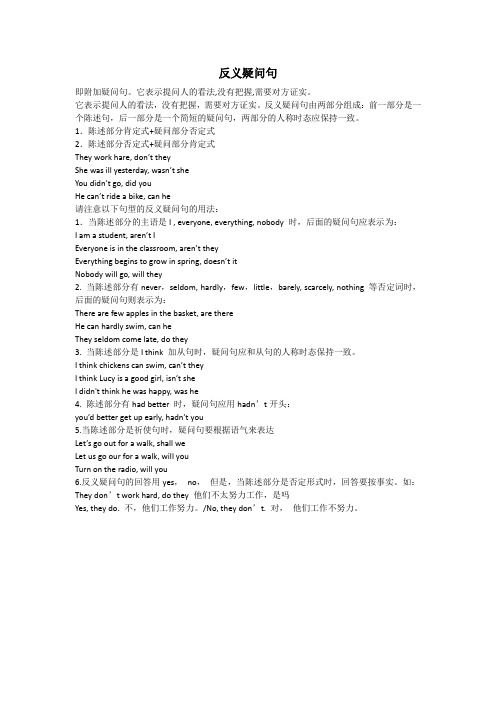
反义疑问句即附加疑问句。
它表示提问人的看法,没有把握,需要对方证实。
它表示提问人的看法,没有把握,需要对方证实。
反义疑问句由两部分组成:前一部分是一个陈述句,后一部分是一个简短的疑问句,两部分的人称时态应保持一致。
1.陈述部分肯定式+疑问部分否定式2.陈述部分否定式+疑问部分肯定式They work hare, don’t theyShe was ill yesterday, wasn’t sheYou didn’t go, did youHe can’t ride a bike, can he请注意以下句型的反义疑问句的用法:1.当陈述部分的主语是I , everyone, everything, nobody 时,后面的疑问句应表示为:I am a student, aren’t IEveryone is in the classroom, aren’t theyEverything begins to grow in spring, doesn’t itNobody will go, will they2. 当陈述部分有never,seldom, hardly,few,little,barely, scarcely, nothing 等否定词时,后面的疑问句则表示为:There are few apples in the basket, are thereHe can hardly swim, can heThey seldom come late, do they3. 当陈述部分是I think 加从句时,疑问句应和从句的人称时态保持一致。
I think chickens can swim, can’t theyI thin k Lucy is a good girl, isn’t sheI didn't think he was happy, was he4. 陈述部分有had better 时,疑问句应用hadn’t开头:you’d better get up early, hadn’t you5.当陈述部分是祈使句时,疑问句要根据语气来表达Let’s go out for a walk, shall weLet us go our for a walk, will youTurn on the radio, will you6.反义疑问句的回答用yes,no,但是,当陈述部分是否定形式时,回答要按事实。
初中英语语法专题专讲--反义疑问句讲解及练习1含答案教学提纲

初中英语语法专题专讲--反义疑问句讲解及练习1含答案反义疑问句【反义疑问句】(一)概念:反意疑问句是由陈述句和附在其后的附加疑问句组成。
其中附加疑问句是对陈述句所说的事实或观点提出疑问,起证实作用,一般用于证实说话者所说的事实或观点。
(二)基本用法要点注意:1、反意疑问句前后两部分谓语应是:“肯定陈述+否定疑问”或“否定陈述+肯定疑问”。
2、简略问句如果是否定式:not应与be,do,will等系动词、助动词、情态动词缩写。
3、简略问句的主语不用名词,应用人称代词。
4、陈述部分含“too...to”时,是否定句。
(三)特殊用法:1) 陈述部分是"there be"结构的,疑问部分用there。
There is something wrong with your watch, isn't there?There will not be any trouble, will there?2)must be 表示“推测”时,疑问部分用isn’t/aren’t+主语(人称代词),不可用“mustn’t”:The bag must be yours, isn’t it?You must be hungry, aren’t you?must 表示“必须”时,疑问部分用needn’t:I must finish my homework today, needn’t I?Mustn’t表示“禁止”时,疑问部分用must.You mustn’t play football in the street, must you?3) a.陈述部分有have/has/had to +v.表“不得不”时,疑问部分常用don't/doesn’t/didn’t +主语。
We have to get there at eight tomorrow, don't we?b.陈述部分have “有”时,疑问句尾可用have,也可用do:She has a new pen, hasn’t/doesn’t she?c. Have表示“吃,喝,玩,度过”等时,疑问句尾用do.They had noodles for lunch, didn’t they?d. Had better 用在陈述部分时,疑问部分用had.You had better finish your homework on time, hadn’t you?e. Have用在完成时中,疑问部分动词用have:She has gone to Beijing with her mother, hasn’t she?4) 陈述部分I am时,疑问部分要用 aren't I.I'm as tall as your sister,aren't I?(我和你姐姐一样高,对吗?)5) 陈述部分用 no, nothing, nobody, never, few, little, seldom, hardly等否定含义的词时,疑问部分用肯定含义。
反义疑问句讲解及习题及答案
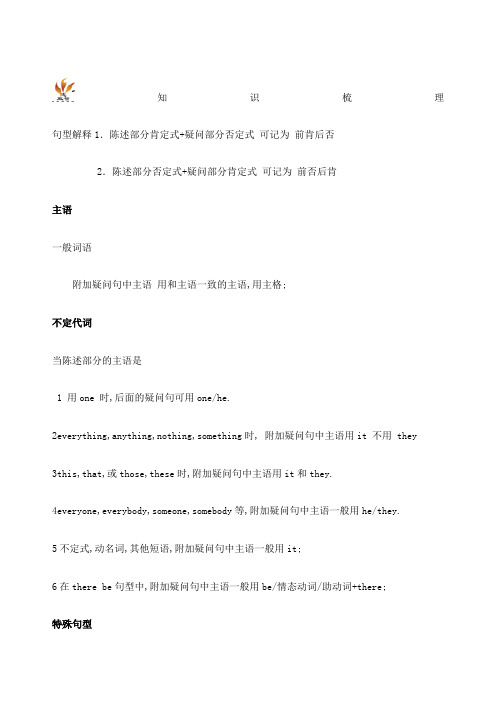
知识梳理句型解释1.陈述部分肯定式+疑问部分否定式可记为前肯后否2.陈述部分否定式+疑问部分肯定式可记为前否后肯主语一般词语附加疑问句中主语用和主语一致的主语,用主格;不定代词当陈述部分的主语是1 用one 时,后面的疑问句可用one/he.2everything,anything,nothing,something时, 附加疑问句中主语用it 不用 they3this,that,或those,these时,附加疑问句中主语用it和they.4everyone,everybody,someone,somebody等,附加疑问句中主语一般用he/they.5不定式,动名词,其他短语,附加疑问句中主语一般用it;6在there be句型中,附加疑问句中主语一般用be/情态动词/助动词+there;特殊句型否定意义的词否定意义的词1当陈述部分有never,seldom, hardly,few,little,barely, scarcely, nothing 等否定意义的词时,后面的反意疑问句则为肯定形式:There are few apples in the basket, are thereHe can hardly swim, can heThey seldom come late, do they2当陈述部分含有否定意思的词是unhappy,dislike,unfriendly等含有否定词缀的派生词,也就是有un-前缀、-less后缀等含有词缀而意思否定的词,当做肯定句处理,疑问部分要用否定形式;如:He looks unhappy,doesn't he他看上去不高兴,不是吗The girl dislikes history,doesn't she这女孩不喜欢历史,不是吗有less,fewer 等词视为肯定词,疑问部分用否定形式;如:There will be less pollution, won't there 表示主语主观意愿的词含有think, believe, suppose, imagine, expect等动词后接宾语从句构成的主从复合句在构成反意疑问句时,视情况不同有两种不同的构成方式;1.当主句的主语为第一人称时,其后的简短问句应与从句相一致;例如:I expect our English teacher will be back this weekend, won't she/heWe suppose you have finished the project, haven't you值得注意的是,当这些动词后接的宾语从句的否定转移到主句时,其仍属否定句,故其后的简短问句应用肯定式,而非否定式;例如:I don't believe that he can translate this book, can heWe don't imagine the twins have arrived, have they此类句子的回答同"前否后肯"型反意疑问句一样,如上述后一个句子,若双胞胎已经到了,则回答为"Yes, they have.";若尚未到达,使用"No, they haven't.";2.当主句的主语为第二、三人称时,其后的简短问句则应与主句相一致此时,否定只看主句,与从句无关...;例如:Your sister supposes she needs no help, doesn't sheYou thought they could have completed the project, didn't youThey don't believe she's an engineer, do theyShe doesn't expect that we are coming so soon, does she3但如果主句的时态是过去时等等,疑问句应和主句的人称时态保持一致;had better或have陈述部分有had better,或其中的have表示完成时态时,疑问句应用hadn’t等开头:You’d better get up early, hadn’t you其他情况句中有have时疑问句应用don't等开头如have表示“有”的时候,有两种形式:-He has two sisters,doesn't he-He doesn't have any sisters,doe she祈使句当陈述部分是祈使句时,疑问句要根据语气来表达当开头是Let‘s时,一定要用shall we;其余都用will you包括 Let us不论肯定否定Let’s go out for a walk, shall weLet us go out for a walk, will youLet me help you,may ITurn on the radio, will youThere be句型There be 句型中,反义疑问部分必须为be 动词 + thereThere are some apples in the basket, aren't thereThere isn't any milk left, is theremust.当陈述部分有情态动词must,问句有4种情况:1mustn't表示“禁止,不可,不必”时,附加问句通常要用must.You mustn't stop your car here,must you 你不能把车停在这地方,知道吗2must表示“有必要”时,附加问句通常要用needn't.They must finish the work today,needn't they 他们今天要完成这项工作,是吗3当must用来表示对现在的情况进行推测时,问句通常要根据must后面的动词采用相应的形式; He must be good at English,isn't he 他英语一定学得很好,是吗4当must+have done表示对过去的情况进行推测一般句中有明确的过去时间状语,问句要根据陈述部分谓语的情况用“didn't+主语”或“wasn't/weren't+主语”;如果强调动作的完成一般没有明确的过去时间状语,问句要用“haven't/hasn't+主语”;She must have read the novel last week,didn't she 她上星期一定读了这本小说,是吗You must have told her about it,haven't you 你一定把这事告诉她了,是吗回答反意疑问句的回答用yes, no, 但是,回答意思相反,当陈述部分是否定形式时,回答要按事实;如:They don’t work hard, do they 他们不太努力工作,是吗Yes, they do. 不,他们工作努力;/No, they don’t. 对, 他们工作不努力肯定反意疑问句的回答当陈述部分为否定式,反意疑问句为肯定式时,其回答往往与汉语不一致,需特别引起注意:"It isn’t cheap, is it" "Yes, it is." “它不便宜吧”“不,很便宜;”"He doesn’t love her, does he" "No, he doesn’t."“他不爱她,是吗”“是的,他不爱她;”此时,"Yes"即不,对前面"It isn't cheap."的否定;否定反意疑问句的回答当陈述部分为肯定式,反意疑问句为否定式时,其回答一般不会造成困难,一般只需照情况回答即可:"It’s new, isn’t it" "Yes, it is." “是新的,对吗”“对,是新的;”"He wants to go, doesn’t he" "No, he doesn’t." “他想去,对吗”“不,他不想去;”此时,"Yes"即是,对前面"It's new."的肯定;回答反意疑问句的原则回答反意疑问句通常应根据实际情况来确定,如有人问你You are asleep, aren’t you 你应回答No, I’m not. 因为既然你能回答,肯定你还没有asleep;但如果别人问你 You aren’t asleep, are you你还没有睡着,对吗,你也只能回答No, I’m not.是的,还没有睡着,而不能回答为Yes, I’m not. 也不能回答成 Yes, I am.“It is a beautiful flower,isn't it”“It isn't a beautiful flower,is it”上述两句句子的回答肯定均为“Yes,it is."否定为“No,it isn't."由上述例子可知,反义疑问句回答与句子本身所包含的中文肯定与否的含义并无太大关联,只需注意事实,肯定即用yes,否定用no,无需考虑句子原本是前否后肯或是前肯后否;反义疑问句练习典题精析1. Linda ate nothing this morning, ___A. didn’t sheB. was sheC. did sheD. wasn’t she2. There’s hardly___ milk in the bottle, _____thereA. no, isn’tB. some, isC. little, isn’tD. any, is3. He has never ridden a horse before, ___A. does heB. has heC. hasn’t heD. doesn’t he4. — He seldom came here, _____— Yes sir.A. didn’t heB. does heC. doesn’t heD. did he5. Everything seems all right, _____A. does itB. don’t theyC. won’t itD. doesn’t it6. One can’t be too modest, can _____A. oneB. heC. itD. we7. No one failed in the exam, _____A. was heB. did oneC. did theyD. didn’t he8. Neither you nor I am an artist, _____ A. am I B. aren’t we C. are we D. ain’t I9. He can’t be her father, _____ heA. isB. isn’tC. canD. can’t10. They have no time to visit the museum, _____A. do theyB. haven’t theyC. don’t theyD. will they11. You’d better go at once, _____ youA. hadn’tB. didC. didn’tD. don’t12. You’d rather work than play, _____ youA. hadn’tB. wouldn’tC. didn’tD. mustn’t13. You dare not do that, _____ youA. don’tB. doC. dareD. daren’t14. He dislikes the two subjects, _____ heA. doesB. doesn’tC. isD. isn’t15. These tools are useless now, _____A. are theyB. aren’t theyC. is itD. isn’t it16. He used to get up at 6:30, _____ he A. didn’t he B. did he C. used he D. wouldn’t he17. He ought to win the first prize, _______ heA. mustn’tB. oughtn’tC. shouldn’tD. Both B and C.18. Let’s go there by bus, ___A. will youB. shall weC. don’t youD. will you19. Let us go to play football, ___A. will youB. shall weC. do weD. are we20. Don’t forget to give Polly some food and change her water, ___A. will youB. shall weC. won’t youD. do you21. —Let’s go shopping this afternoon, _____— All right.A. will weB. shall weC. don’t weD. are we22. — Pass me the dictionary, _____— Yes, with pleasure.A. would youB. will youC. won’t youD. wouldn’t you23. There is little water in the glass, ____ A. isn’t there B. isn’t it C. is it D. is there24. There won’t be any concert this Saturday evening, _____A. will there notB. will thereC. is thereD. won’t25. — I guess she taught herself Japanese, ______— Yes.A. don’t IB. did sheC. do ID. didn’t she26. I don’t believe you are right, _____A. are youB. do youC. won’t youD. do27. She doesn’t think that Tom sings best in the class, _____A. does sheB. doesn’t sheC. does heD. doesn’t he28. I know you didn’t want to hurt me, _____A. did youB. didn’t youC. do ID. don’t I29. If my father were here he would be very happy, _____ A. weren’t he B. were he C. wouldn’t he D. would he能力提升1. It’s the third time that John has been late, ____A. hasn’t heB. isn’t heC. isn’t itD. hasn’t it2. Let’s take a rest, ___________.A. will weB. shall weC. shan’t weD. won’t we3. Let us pass, _________ A. shan’t we B. shall we C. won’t we D. will you4. Wait a minute, __________A. shall youB. will youC. do youD. don’t you5. The suit’s finished, __________ A. doesn’t it B. isn’t it C. haven’t you D. hasn’t it6. He’s posted the letter, _________he A. isn’t B. doesn’t C. hasn’t D. wasn’t7. They’d go with us, __________A. wouldn’t theyB. didn’t theyC. hadn’t theyD. couldn’t they8. What fresh air, ________ A. is it B. does it C. isn’t itD. doesn’t it9. The Emperor’s clothes became the talk of the whole city, _________A. did itB. didn’t itC. did theyD. didn’t they10.Mr. And Mrs. Turner work in this hospital, ________A. are theyB. aren’t theyC. do theyD. don’t they11. She has breakfast at six every day, ________A. has sheB. hasn’t sheC. does sheD. doesn’t she12. Nothing seems to please her, _________ A. does it B. doesn’t it C.is it D. isn’t it13. She never tells a lie, ________ A. does she B. doesn’t she C. is itD. isn’t it14. You hardly know each other, _________A. do youB. don’t youC. have youD. didn’t you15. The man in blue must be your brother, _____A. mustn’t heB. needn’t heC. isn’t heD. is he16. I don’t think he will come to our party, _____A. will heB. won’t heC. does heD. do I17. I suppos e he’s serious, ___________A. do IB. don’t IC. is heD. isn’t he18. Wang said that he was not there then, _____A. did heB. didn’t heC. was heD. wasn’t he19. You daren’t say that to him, _________A. dare youB. do youC. daren’t youD. don’t you20. You must have read about Dickens long ago, __________A. mustn’t youB. haven’t youC. can’t youD. didn’t you随堂小测三智题库QYF21. You’d better not smoke here, ________A. will youB. shall youC. have youD. had you22.There isn’t going to be a volleyball match next week, __________23. A. is it B. isn’t it C. is there D. isn’t there23. There used to be a church behind the cemetery, _____________A. didn’t thereB. used thereC. usedn’t itD. didn’t it24. What a lovely day, _________ A. doesn’t it B. hasn’t it C.won’t D. isn’t it25. You must have been there, ____________A. have youB. did youC. haven’t youD. didn’t you26. That is your school, ___________A. isn’t thatB. mustn’t itC. isn’t itD. won’t it27. She dislikes this skirt, _________________A. doesn’t sheB. does sheC. isn’t sheD. is she28. No one can stop us from going there, ______A. can’t itB. can theyC. can’t theyD. can one师生互动分数评语错题归档确认答案典题精析. 1-5 CDBDD 6-10 ACCAA 11-15 ABCBB 16-20 ADBAA 21-25 BBDBD 26-29 AAAC 能力提升. 1-5 CBDBB 6-10 CACDD 11-15 DAAAC 16-20 ADBAD随堂小测21-25 DCADC 26-28CAB。
(完整版)初中英语反义疑问句讲解练习及答案

反义疑问句一、考点、热点回顾【词汇辨析】1.too,either与alsotoo"也",表示肯定意义,与肯定的表达方法连用;either"也不",表示否定意义,与否定的表达方法连用。
(1)—My brother likes to play soccer.我哥哥喜欢踢足球。
—I do, too.我也是(喜欢)。
(2)—My brother doesn't like to play soccer.我哥哥不喜欢踢足球。
—I don't, either.我也不喜欢。
also也可以表示"也",但一般情况下放在动词之前。
如:We also love talk shows.我们也喜欢访谈节目。
2. too much 和much tootoo much 后接不可数名词,用来表示数量太多,意思是“……太多了(数量多)”much too后接形容词,用来说明程度的,意思是“太……(程度深)”如:too much water 太多水(表数量)much too heavy 太重了(表程度)【固定搭配】be + adj. + 介词动词+ 名词/ 代词/ 副词+ 介词catch up with赶上He worked hard to catch up with his classmates.come up with找到;提出(答案、解决办法等) Experts will come up with a clear answer.get on well with与......相处融洽Can we human beings get on well with nature?give birth to生(孩子) He thought that his wife would give birth to twins.help yourself / yourselves to自取;随便吃Come on, help yourself to some fish .【反义疑问句】(一)概念:反意疑问句是由陈述句和附在其后的附加疑问句组成。
- 1、下载文档前请自行甄别文档内容的完整性,平台不提供额外的编辑、内容补充、找答案等附加服务。
- 2、"仅部分预览"的文档,不可在线预览部分如存在完整性等问题,可反馈申请退款(可完整预览的文档不适用该条件!)。
- 3、如文档侵犯您的权益,请联系客服反馈,我们会尽快为您处理(人工客服工作时间:9:00-18:30)。
一、反义疑问句的基本结构与形式反义疑问句(The DisjunctiveQuestion) 即附加疑问句,是英语四大问句之一。
它表示提问人的看法,没有把握,需要对方证实。
句尾升调表示疑问,降调表示反问。
反意疑问句,由一个陈述句加上一个短问句而构成,基本构成形式是:陈述句+动词(肯定或否定)+主语?如:①She often has lunch at school, doesn’t she?②You don’t like sports, do you?反意疑问句通常对应规则:一)、反意疑问句中问句部分的动词与陈述部分的动词在语气上成相反的对应关系,即:)肯定+否定?否定+肯定?如:①You can’t do it, can you?②They are very late for the meeting, aren’t they?二)、反意疑问句中问句部分的动词与陈述部分的动词种类要对应一致。
如:①He has supper at home every day, doesn’t he? (不能用hasn’t he?)②They have known the matter, haven’t they? (不能用don’t they?)三)、反意疑问句中问句部分的动词在时态上应和陈述部分的时态一致。
如:①They will go to town soon, won’t they?(不能用don’t they?或aren’t they?)②He works very hard, doesn’t he?(不能用didn’t he?或won’t he?)基础练习1. You are an actor, ________ _____ ?2. He is a good boy, ________ ______ ?3. It was fine yesterday, _______ ___ ?4. You were studying when I called you last night, __________ _____ ?5. She is going to visit me, _____ ____?6. I am Chinese, ______ ____?7. It often rains here, ________ ___ ?8. He likes soccer, _________ ____ ?9. You have a headache, _______ ___ ?10. I called you yesterday, _______ __?11. You will go to America, ______ ___ ?12. We have ever been to Shanghai, _________ ______ ?13.His mother is a doctor, ______ ____ ?14. The dogs are fighting, _______ _____?15 There is a boy in our classroom, _______ _______ ?17. There were many cars in the street,_________ ________ ?18. There will be robots in our families,________ ______ ?19. Sit down please, _______________ ?20. Please call me, _________________?21. Let’s go home,_________ ?22. Let us go home, ________________ ?23 . Let me see, __________________ ?答案1.aren't you 2.isn't he 3.wasn't it 4.didn't you 5.won't she 6.aren't 7.doesn't it 8.doesn't he9.don't you 10.didn't you 11.won't you 12.haven't we13.isn't she 14.aren't they 15.isn't there 17.weren't there 18.won't there 19.will you 20.will you 21.shall we22.will you 23.will you二、反义疑问句的回答反义疑问句的回答始终遵从事实,事实是肯定用Yes+肯定句,事实是否定用no+否定句,如事实是你喜欢英语:You like English,don't you? Yes,I do.(是的,我喜欢。
)You don't like English,do you ?Yes,I do.(不,我喜欢)如事实是你不是老师:you are a teacher,aren't you?No,I am not.(不,我不是)you aren't a teacher,are you?No,I am not.(是的,我不是)三、反意疑问句的特殊形式一)、祈使句后的反意疑问句:祈使句后加一个反意疑问句,使祈使句变得更加委婉。
肯定祈使句的反意疑问句通常用will you, won’t you, would you, can you, can’t you等来表达不同的含义。
在否定的祈使句后的反意疑问句通常只用will you。
1、表示“请求”,肯定祈使句的反意疑问句用will you。
如:①Give me a hand, will you?②Pass me a book, will you?2、表示“邀请”、“劝诱”时,肯定祈使句后的反意疑问句用won’t you。
如:Have another cup of tea, won’t you?3、表示“催促”、“不耐烦”时,肯定祈使句后的反意疑问句用can’t you。
如:Stop talking, can’t you?4、用“Let’s…”开头的肯定祈使句表示“提议、建议、主张”,其后的反意疑问句用shall we。
如:Let’s have a try, shall we?但是以Let us…或Let me…开头的祈使句后的反意疑问句则要用will you。
如:Let us go now, will you?5、否定祈使句的反意疑问句只用will you。
如:Don’t take away my dictionary, will you?以Let’s not…开头的祈使句后的反意疑问句用all right或OK。
如:①Let’s not go fishing, all right?②Let’s not talk about it any more, OK?二)、复合句的反意疑问:复合句的反意疑问的主谓语要视其主要内容而定,不能一概说以主句为准还是以从句为准。
1、多数复合句后的反意疑问句的主、谓语同主句的主、谓语一致。
如:①He said he was a teacher, didn’t he?②John thinks the rain is ending, doesn’t he?③You don’t mind if I go now, do you?2、主句是I think(suppose, consider, believe, guess, expect, imagine, feel, am afraid, hear, say等)+宾语从句时,反意疑问句的主、谓语应与从句的主、谓语一致。
如:①I don’t think he will come, will he?②I heard that he was very honest, wasn’t he?3、并列复合句的反意疑问句的主、谓语应与相近的分句的主、谓语相一致。
如:John isn’t a hard-working student, for he has been late for three times, hasn’t he?三)、含有情态动词或助动词的反意疑问句:1、当陈述部分含有情态动词must,其意义表示“必须、必要”时,其后的反意疑问句用mustn’t或needn’t。
如:①You must do it today, mustn’t you?②She must look after her sister, needn’t she?如果must的含义表示“一定是、想必”等推测意义时,其后的反意疑问句则要依据句中的谓语动词的时态结构采用be/have/did/do+not等相应形式。
如:①He must be ill, isn’t he?②You must have seen the film before, haven’t you?2、如果陈述部分用了must have+P.P.(过去分词),但明示或暗示了过去的时间,其反意疑问句用过去时。
He must have seen him yesterday, didn’t he?3、陈述部分含情态动词ought to,其后反意疑问句用oughtn’t或shouldn’t 均可。
如:①I ought to come here, oughtn’t I?②You ought to go by ship, shouldn’t you?4、陈述部分含情态动词used to,其后反意疑问句用usedn’t或didn’t均可。
如:①Tom used to live here, usedn’t he?②They used to work in the shop, didn’t they?5、陈述部分含有have/has/had to时,其后的反意疑问句用do的相应形式。
如:①You have to go, don’t you?②He has to stay in bed all day, doesn’t he?③I had to keep it well, didn’t I?但是在陈述句中用have/has/had got to来代替have/has/had to时,反意疑问句用have的相应形式。
如:①Ann has got to see a doctor, hasn’t she?②You haven’t got to go to school on Sunday, have you?6、陈述部分有had better/would rather时,其后的反意疑问句用hadn’t/wouldn’t。
